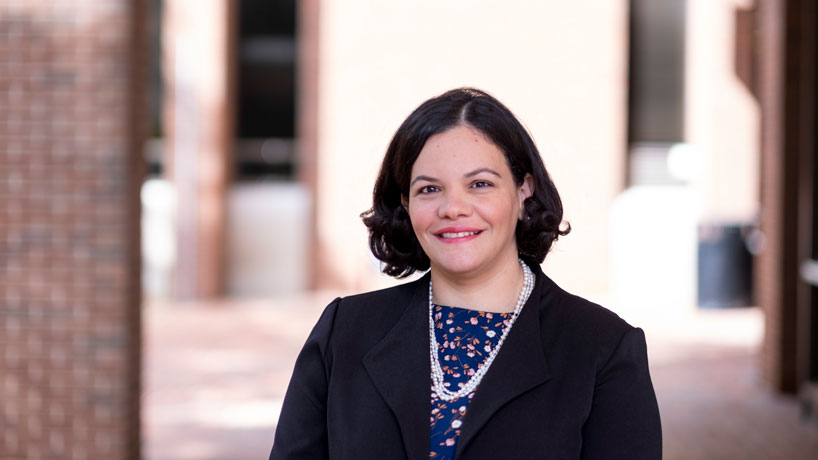
Trilce Encarnacion and her collaborator, Ruben Proaño, received a grant for a program they developed to help underrepresented students in the areas of research and STEM connect with professionals in the fields. (Photo by August Jennewein)
Trilce Encarnacion didn’t see a lot of researchers or PhD students who looked like her while pursuing her undergraduate degree in systems engineering and computer science at Pontificia Universidad Católica Madre y Maestra in her native Dominican Republic.
Though the lack of representation didn’t hinder Encarnacion’s educational and professional ambitions, seeing people of her background would have, at the very least, made her feel less isolated on her track.
Later, the isolation would help inspire her to find ways to increase diversity in future generations of STEM professionals and researchers.
Encarnacion, an assistant professor of supply chain and analytics at the University of Missouri–St. Louis, developed a program called the Minority Issues Forum Undergraduate Students Workshop that aims to help underrepresented college students get involved in STEM research. The workshop is designed to prepare them to attend the annual fall conference of her professional association, the Institute for Operations Research and Management Sciences, also known as INFORMS. Attending the conference not only offers students the chance to gain insights into varied STEM professions but also helps them shape a career path and connect to valuable networks.
Encarnacion believes connecting with other diverse operations research professionals will help students picture themselves in the field.
“When I was an undergrad, I didn’t know anybody who worked in any of these fields,” Encarnacion said. “I didn’t know anybody that even got a PhD, so I believe my life would have been different if I’d seen people like me – leaders in fields that don’t traditionally represent diversity. Ever since I was a PhD student, I’ve been working on various initiatives to increase representation in the profession.”
Reaching students before their senior year, Encarnacion believes, is important in helping them identify a profession.
“I want to get students early so that they can see what are the exciting opportunities,” she said. “With the workshop and training we give them before the conference, we also show them what a career path can look like. It can be research intensive, meaning go to grad school or get a PhD, or it can mean becoming a practitioner.”
The first cohort of 10 students began last fall, and three students attended the conference in Anaheim, California, while the other seven attended virtually. Last month, seven students traveled to Indianapolis for this year’s conference.
INFORMS provided initial funds to pilot the program. Encarnacion and her collaborator, Ruben Proaño, who is an associate professor of industrial engineering at Rochester Institute of Technology, recently received a three-year grant from the National Science Foundation to continue it.
“We reached out to the National Science Foundation after the success of the first year,” Encarnacion said. “They were very receptive.”
The curriculum for the workshop, which Encarnacion created, includes a speaker series featuring professors from a variety of institutions as well as professionals from companies such as Google, Netflix, and others that hire operation researchers. The intention of the program is to present students with career options they may not have previously considered or known existed and to prepare them to best utilize the opportunities at the conference.
“We give them an orientation about operations management, operations research and management science,” Encarnacion said. “Then we show them the different paths they can take. We also teach them how to plan to participate in the conference. What are the highlights? What events shouldn’t they miss? We help them find sessions that cater to their interest.”
Encarnacion also notes that INFORMS has about 8,000 members, less than 3% of whom are Hispanic or African American. So her students won’t see a lot of people who mirror their cultural identities. That fact underscores the importance of the program’s mission.
There is even more opportunity for interested students to participate in future programs because the parameters for selection have been expanded to allow not only female students and those of underrepresented racial and ethnic backgrounds but also students who are eligible for federal student loans.
The program’s charge to introduce more diverse students to careers in research and STEM is important to Encarnacion because she believes diversity benefits her industry.
“I feel we are better and stronger when we have more voices accounted for in the spaces where decisions are made,” she said. “As operations researchers and management scientists we have an amazing toolbox to guide decisions in the private and public sector. Every time you’re creating a model, every time you are using any algorithm to make decisions, no matter how much you try, you are introducing a lot of information based on your personal experience. So we if we incorporate these different voices in these decision-making processes, we’re going to have stronger outcomes.”














